- Category
- Life in Ukraine
How Kyiv Residents Live Through Months of Sleepless Nights Amid Constant Russian Drone Attacks
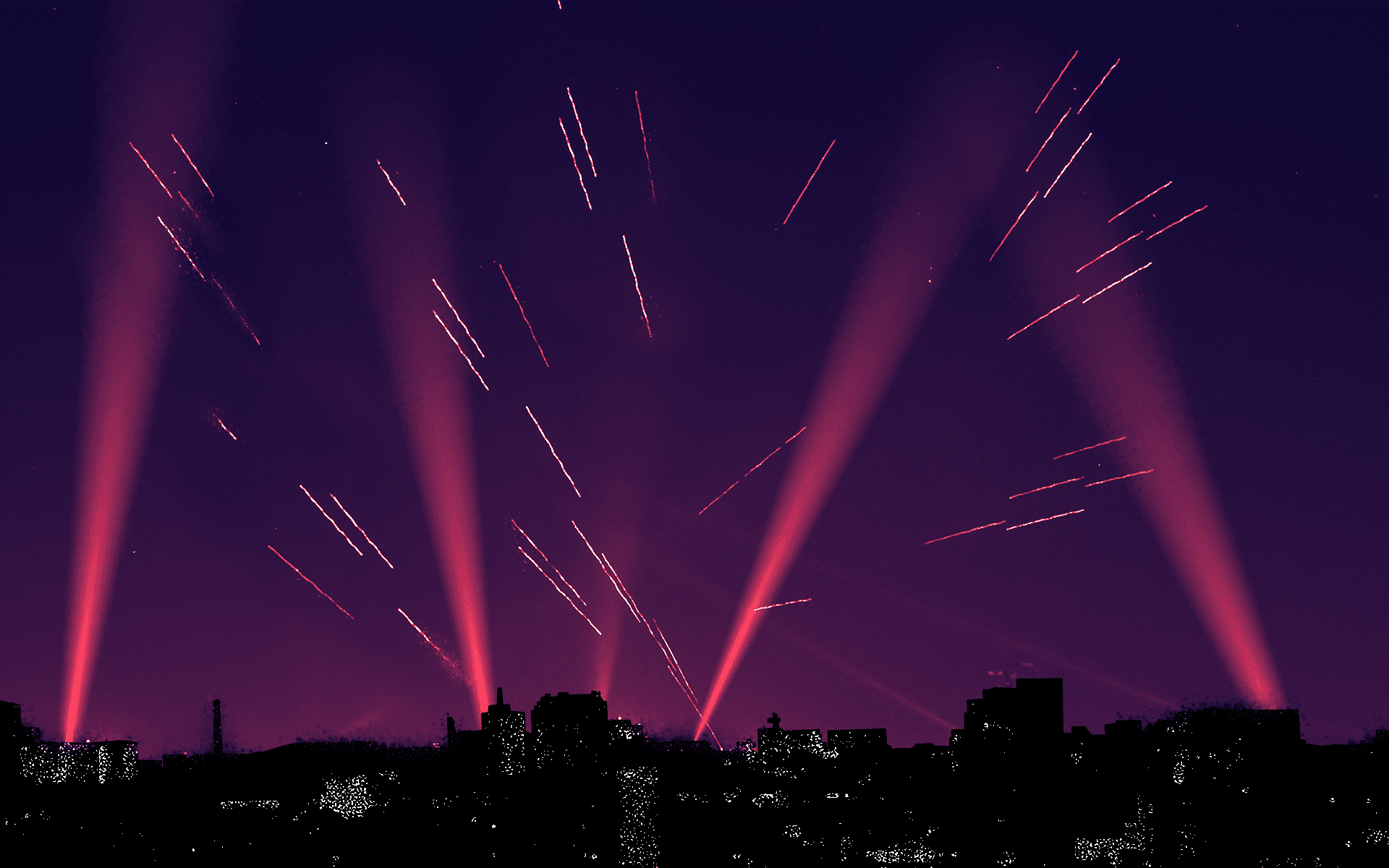
As the war in Ukraine continues, civilians in Kyiv share what it's like to live through nightly Russian drone attacks and the toll it takes on their physical and mental health.
It was a Saturday morning. Darina Amirova, 28, woke up in her apartment in the center of Kyiv, surrounded by glass fragments from her shattered window. The night before, she had heard explosions—some loud enough to rattle her nerves—but she stayed in bed, trying to sleep after an intense Friday that ended at 3 a.m. It wasn’t until the morning that she realized a shockwave had damaged her bedroom while she slept.
“The first thought that came to my mind was that it’s Saturday morning. This isn’t how weekend mornings are supposed to start,” she told me.
Darina didn’t feel fear when she understood what had happened, perhaps because it was now the third year of the full-scale invasion. “My fear has already dulled somehow. All I felt was despair and an overwhelming, deep sadness,” she continued.
Darina got up and started cleaning the room, brushing glass off her bed and sweeping it up with a broom. Her broken window let in the cold November air, and she knew it would only get colder with each passing day.
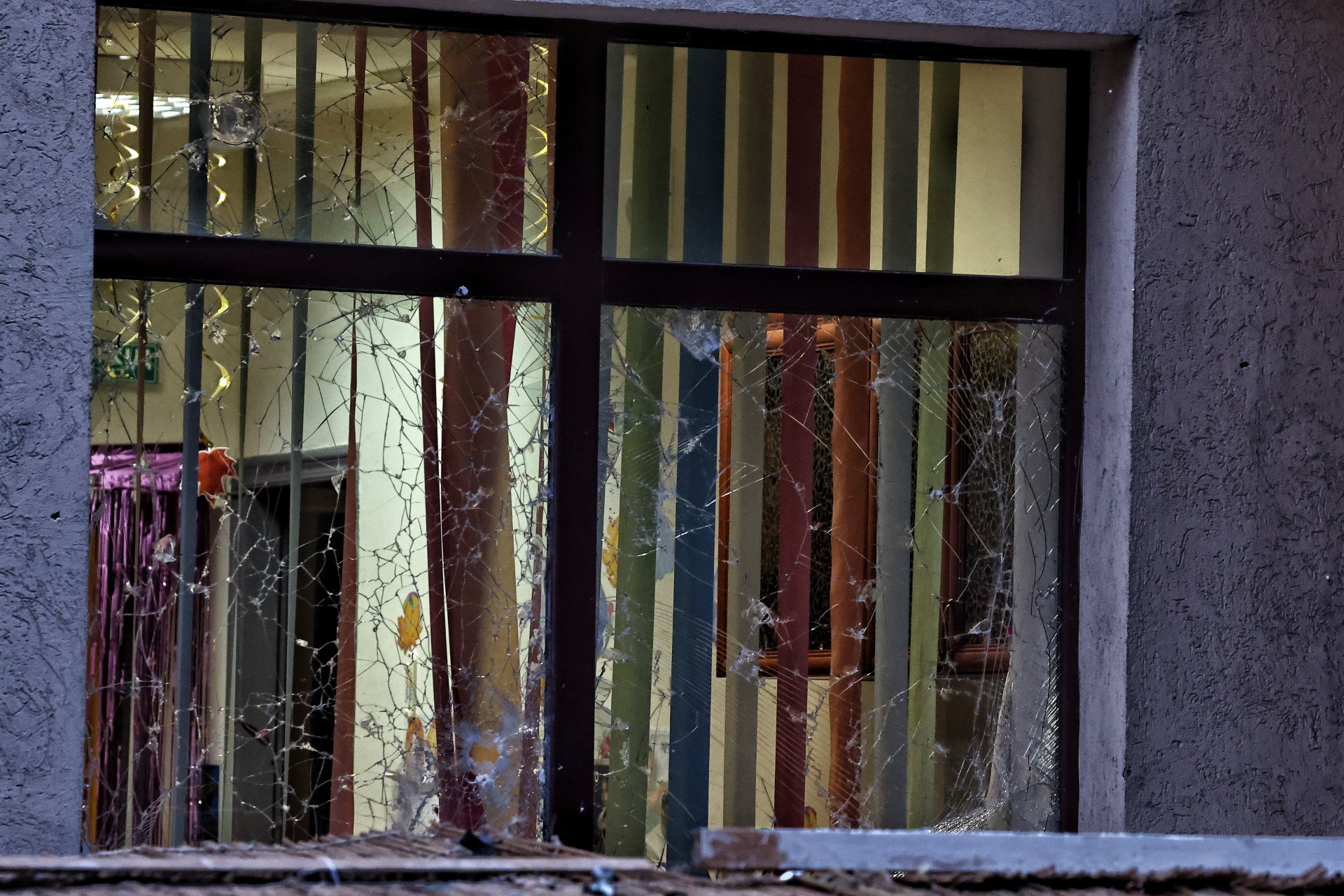
That experience marked a turning point in her life. Her body grew more tense, and the fear of nightly explosions didn’t fade—it only intensified. Now, Darina can’t lie in bed, trying to sleep when there is a danger of shelling. Instead, she goes to the hallway to wait out the danger, whether it’s night or day, whether she has energy or is completely drained.
For some, the fear comes from living through the same experience; for others, it’s from hearing the constant noise of drones or explosions every night. Many Ukrainians face the same struggles—fear of the dark hours, heightened nervousness, and sometimes apathy. The relentless nightly attacks rob them of sleep, leaving an entire nation grappling with exhaustion and sleep deprivation.
Darina considers herself “fortunate” because she survived and remains physically unharmed. “I understand that, compared to others, I have nothing to complain about. Some people didn’t wake up this morning. But still, this isn’t how it’s supposed to be.”
On that day, November 2nd, 2024, Russia’s shelling of Ukrainian cities left six dead and over 75 injured, including children aged 10, 11, and 16. The attack involved an X-31P guided missile and 71 Shahed-type combat drones, which damaged civilian buildings and power lines.
In Kyiv alone, falling debris injured a woman, while eight private homes, one apartment in a multi-story building, and two outbuildings sustained damage. Power lines in four districts were also hit, leaving almost 2000 residents in one settlement without electricity.
Saturday’s assault wasn’t a random occurrence but part of escalating pressure. Just weeks later, on November 17th, Russia launched the largest missile strike on Ukrainian territory in three months. This time, it was a Sunday morning—a day Ukrainians could have spent sleeping but didn’t.
Even though the biggest attacks seem to happen on weekends, that doesn’t mean the other days are calm or safe. Sleepless nights due to massive drone attacks have become routine for Ukrainians in recent months. Since September, Russia has been shelling Ukraine daily, primarily using Iranian-made Shaheds. These drones are cheap compared to missiles and can reach any part of Ukraine.
Three meters in length and deployed in swarms of up to 100, sometimes more, these drones fly loudly over Ukrainian cities and villages every night. Air raid sirens blare for hours as the drones circle in the skies, shifting their destinations until they are either shot down or hit their targets.
With each passing day, air defense systems work harder while civilians grow more exhausted and less rested. While Kyiv is considered safer due to its robust air defense and distance from the Russian border compared to the eastern, southern, and northern regions, the capital still endures relentless attacks nearly every day, with the intensity only escalating.
Endless nights of the Ukrainian drone hunters
While ordinary Ukrainians try to find moments of rest in the safety of bomb shelters or darkened hallways, air defense teams remain vigilant through the long nights—scanning the skies for threats.
Vladyslav Melnyk, a Ukrainian artist who joined the military in 2023 and is now part of the Air Forces of Ukraine based in Kyiv, explains that this shift in tactics is part of Russia's strategy to exhaust Ukrainian resources and morale.
"They are deploying not only Shahed drones with combat payloads but also decoy drones, which make up about a quarter of the total launched from Sumy and Chernihiv directions," he tells me. “It’s impossible to determine in the air whether a drone carries a warhead or not. As a result, we must engage every target, which strains our personnel and equipment.”
Russians aim to drain Ukraine`s limited resources—including air defense ammunition—while keeping personnel on constant alert. "Our teams are overstretched," Melnyk notes. "They’re working around the clock with little time for rest, and the constant threat of attacks leaves them exhausted."
According to President Volodymyr Zelenskyy, Moscow is now deploying about 10 times as many drones as it did last fall. In October alone, Ukraine faced more than 2,000 drone attacks—a clear escalation since September 2024.
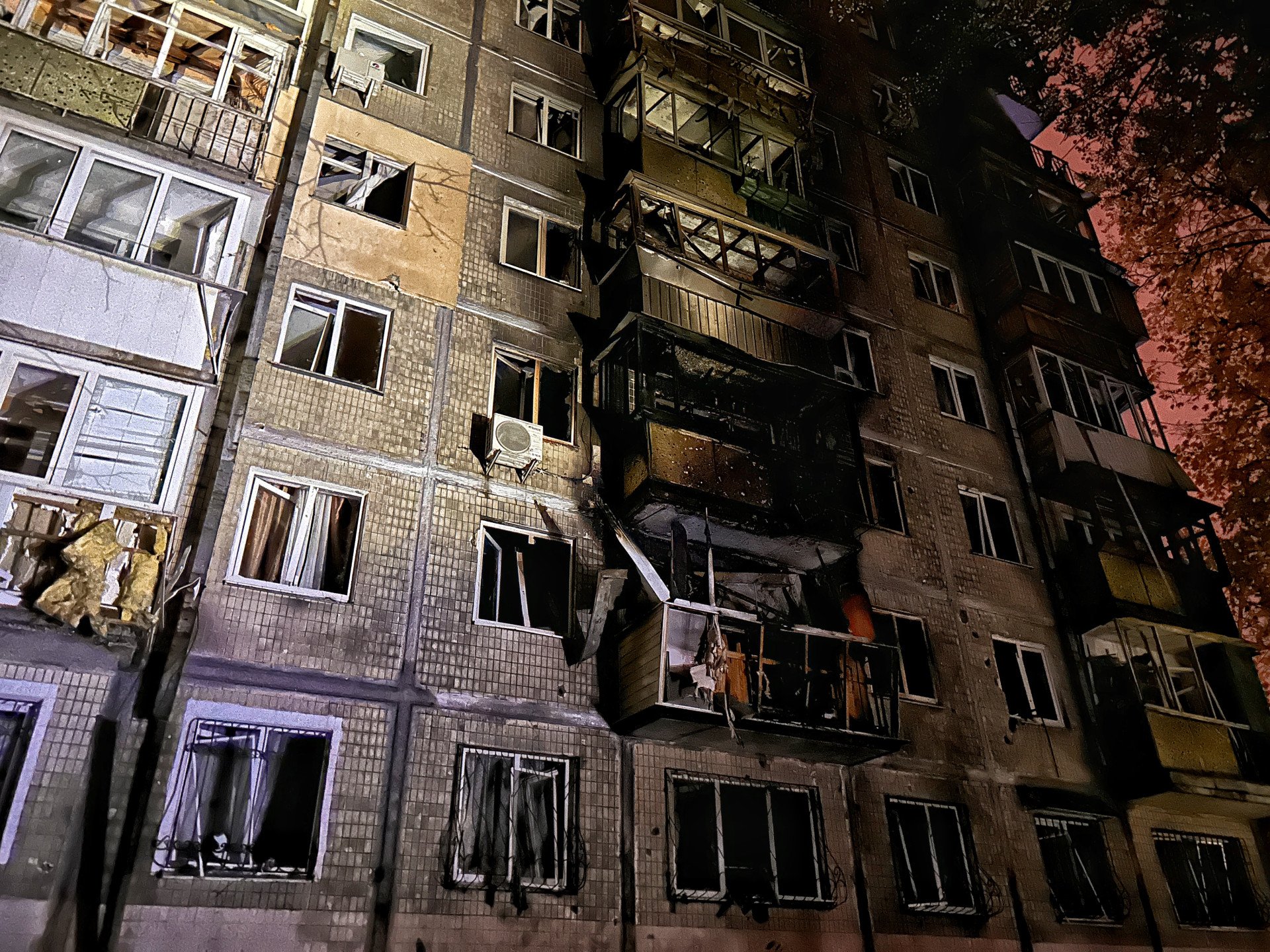
The nighttime timing of these attacks amplifies their impact. "By conducting operations at night, Russia is not only disrupting our sleep cycles but also aiming to destabilize society," Melnyk says.
With the heating season nearing, Russia has again started to target Ukraine's energy infrastructure—as it did last year. The relentless drone and missile attacks have already led to rolling power outages. A massive strike on November 17th, involving 120 missiles and 90 Shahed drones, forced many regions to reintroduce scheduled blackouts, leaving Ukrainians without electricity and heating during the harsh cold months.
Meanwhile, air defense forces work around the clock, intercepting every drone to prevent potential threats. "The mental and physical toll is immense, but giving up is not an option," Melnyk emphasizes.
Home is no longer safe
In the third year of the war, 41-year-old art curator Katya Taylor made a bed for herself in the hallway. The turning point in this decision was the Russian drone attack on Kyiv during the night of October 25th, when a drone struck a residential building in the Solomianskyi district, killing a 14-year-old girl. For Ukrainians, home is no longer a safe space.
“I live in the same area. The same kind of building, almost the same floor. That apartment burned, and the girl died. For a moment, I thought it was my home,” Katya says, explaining her decision.
“When the attacks became constant, I felt I’d be calmer in the hallway.”
Solomianskyi district suffers some of the heaviest attacks in Kyiv due to its proximity to Kyiv International Airport, a frequent Russian target. It’s also the entry point for many airstrikes heading toward the city center.
Despite being one of the hardest-hit areas, many people still live there. Before the war, Solomianskyi was a popular residential district known for its greenery, comfort, and convenient location near the city center.
“It might sound strange that I sleep in the hallway, but I’m not on the floor or in a sleeping bag. I’ve made it cozy—I love my home, and everything is beautiful, even there. It’s just that it’s a hallway,” she explains.
Though Taylor has made the best of the situation, she still struggles to get proper sleep due to the intensity of the attacks.
“I feel anxious and irritable, and my anxiety disorder has worsened. I decided to leave the city for a while. When I returned, I realized how much we’ve adapted to a life that’s far from normal. And it raises the question—how long can the body endure this state?” she wonders.
Night explosions disrupt sleep cycles, preventing the deep, restorative phases necessary for mental processing, explains Natalia Domres, a neurologist and sleep consultant.
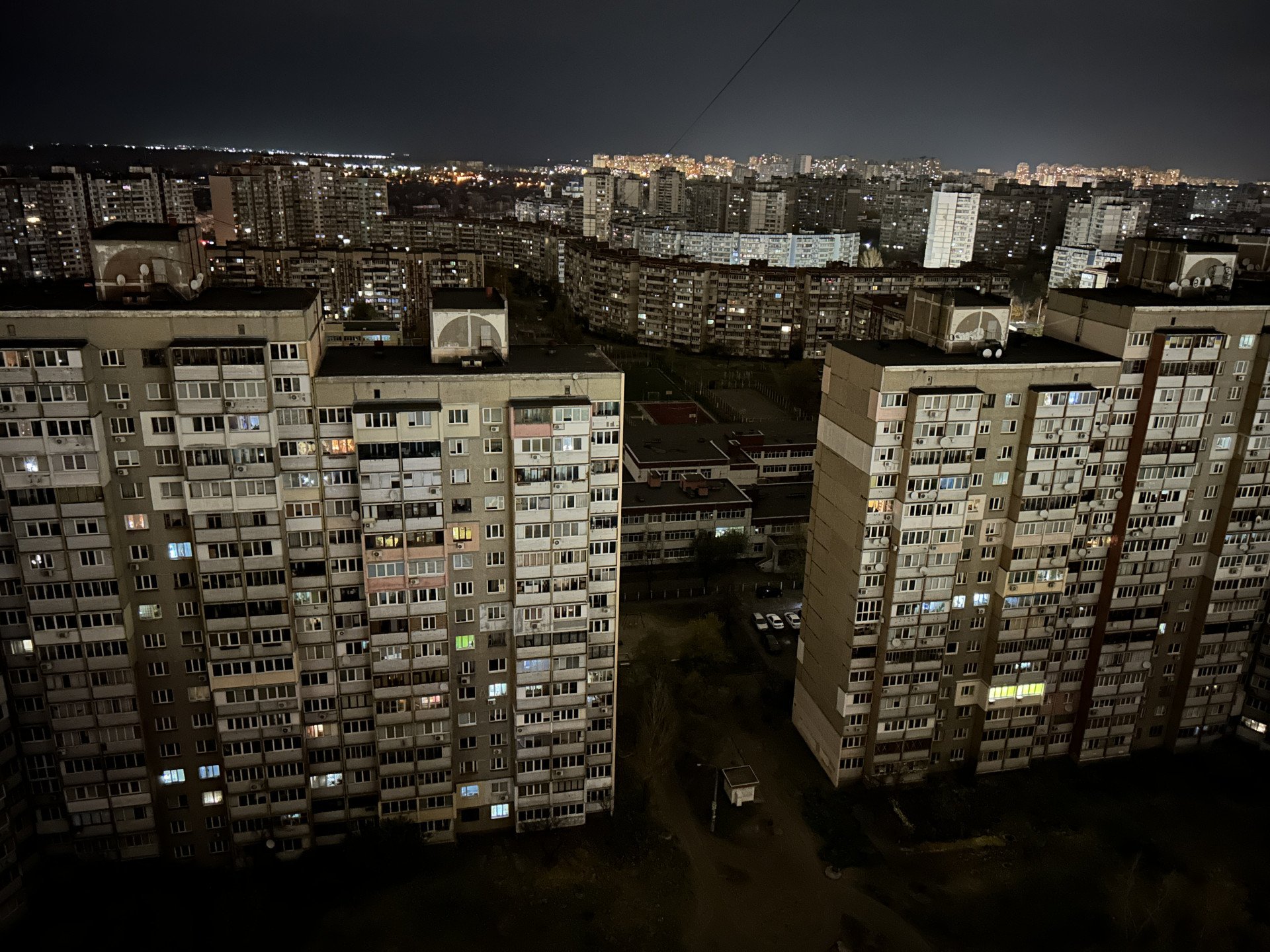
“When sleep is constantly interrupted, we can’t process the day’s experiences, and it feels like one endless day that never ends,” she says. This can lead to heightened anxiety and depression, Domres warns.
According to the World Health Organization, around 10 million Ukrainians—nearly one in three—are at risk of developing mental health disorders, a situation that is worsening as winter approaches.
Sleep deprivation, combined with other stressors of war, also takes a toll on physical health. “It’s the body’s natural response to abnormal circumstances,” Domres explains. “Cardiovascular diseases can worsen. Weight changes may occur. Diabetes, already a leading cause of mortality, becomes an even greater risk. These conditions exist, but the stress exacerbates them.”
Even when there is no immediate danger of attacks in Kyiv, the bodies and minds of its residents remain on edge. “It’s not just the shelling that affects me directly. It’s the atmosphere of uncertainty, the winter, and all these unexpected or loud noises that nobody reacts to normally anymore,” says Katya Taylor.
This constant tension is a shared experience for many. “All of this will leave lasting effects on the nation’s health. Medicine still has much to uncover about the long-term consequences,” Domres says.
Coping with psychological terror
Natalia Domres also lives in Kyiv’s Solomianskyi district, enduring nearly every Russian attack on the city since 2022. While her expertise helps her cope, she admits that even professionals need support in such extreme circumstances. “I have my own psychologist, and I reach out when I feel I need help,” she shares.
Domres highlights that while there are various ways to maintain well-being in such conditions, getting enough sleep is crucial.
“If sleep is disrupted at night, it’s important to catch up during the day or on weekends,” she says. “Western guidelines often recommend limiting daytime naps to under an hour, but those recommendations weren’t designed for situations like ours.”
For Katya Taylor, sleeping in the hallway offers a small sense of security, as it spares her the need to rush to a shelter in the middle of the night. “At least I can stay in bed until morning,” she says.
Though unconventional, this setup helps her manage intrusive thoughts. “I live in a studio, so my hallway isn’t fully shielded, but it gives me some protection. Strategically, I think, ‘At least my head will be safe,’ and that means I can keep going,” she says with a mix of humor and resilience.
Domres recalls how she used to take shelter in a nearby underground parking lot, which became a refuge for many. However, as time went on, finding the energy, time, and strength to leave home during every attack became increasingly difficult
“It’s not ideal, especially living near Sevastopol Square, which has been heavily targeted by Russia lately. But there’s simply no energy left to go,” she explains.
With two school-age children, the situation is even more challenging for Domres. “They’re not little kids, but it’s still hard to wake them and convince them to move. So now, we stay home and sometimes head to the hallway instead,” she says.
As a doctor, Domres recognizes her own behavior as a textbook case of exhaustion and adaptation. “It’s impossible to react to every event with the same intensity as the first time. Emotions naturally adjust, and this is how the psyche copes,” she explains.
At the same time, Domres views adaptation as a necessary survival strategy. “It’s fortunate that people are adapting because the pressure is only increasing. Without this psychological adjustment, it would be impossible to endure these circumstances,” she notes.
“This is terror aimed at disrupting everyday life and breaking routines of Ukrainians, but we adapt and continue overcoming each new challenge.”



-6ead6a9dd508115a5d69759e48e3cad1.jpg)
-29a1a43aba23f9bb779a1ac8b98d2121.jpeg)
-7f50738271c122a9b5e663cb80703dd6.jpg)

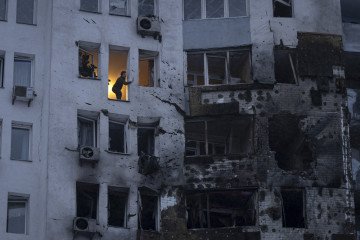
-554f0711f15a880af68b2550a739eee4.jpg)